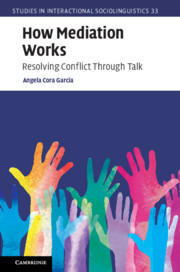Book contents
- How Mediation Works
- Studies in Interactional Sociolinguistics
- How Mediation Works
- Copyright page
- Dedication
- Contents
- Acknowledgments
- 1 Introduction
- 2 The Interactional Organization of Mediation
- 3 Minimizing and Managing Argumentative Talk in Mediation
- 4 Disputants’ Opening Statements and Persuasive Arguments in Mediation
- 5 Mediator Representation of Disputants’ Positions
- 6 Soliciting Proposals for Resolution of the Dispute
- 7 Producing Ideas for Resolution of the Dispute
- 8 Mediator Teamwork
- 9 Autonomy, Empowerment, and Neutrality in Divorce and Small Claims Mediation
- Appendix: Transcription Symbols
- References
- Index
9 - Autonomy, Empowerment, and Neutrality in Divorce and Small Claims Mediation
Published online by Cambridge University Press: 29 July 2019
- How Mediation Works
- Studies in Interactional Sociolinguistics
- How Mediation Works
- Copyright page
- Dedication
- Contents
- Acknowledgments
- 1 Introduction
- 2 The Interactional Organization of Mediation
- 3 Minimizing and Managing Argumentative Talk in Mediation
- 4 Disputants’ Opening Statements and Persuasive Arguments in Mediation
- 5 Mediator Representation of Disputants’ Positions
- 6 Soliciting Proposals for Resolution of the Dispute
- 7 Producing Ideas for Resolution of the Dispute
- 8 Mediator Teamwork
- 9 Autonomy, Empowerment, and Neutrality in Divorce and Small Claims Mediation
- Appendix: Transcription Symbols
- References
- Index
Summary
As previous research and mediation textbooks have revealed, mediators use many techniques to facilitate the session and help the disputants achieve their goals, such as summarizing and paraphrasing disputants’ positions, soliciting ideas for resolution, and asking questions.1 However, whether these techniques are effective in a given mediation session depends not just on the specific technique used, but on the interactional skill of the mediators to effectively formulate and place their interventions in the ongoing flow of interaction. Mediation is an interactional process that involves the coordinated action of all participants. The interactional competence of both mediators and disputants is critical for its successful completion, regardless of whether an agreement is reached.
- Type
- Chapter
- Information
- How Mediation WorksResolving Conflict Through Talk, pp. 223 - 247Publisher: Cambridge University PressPrint publication year: 2019

